Featured
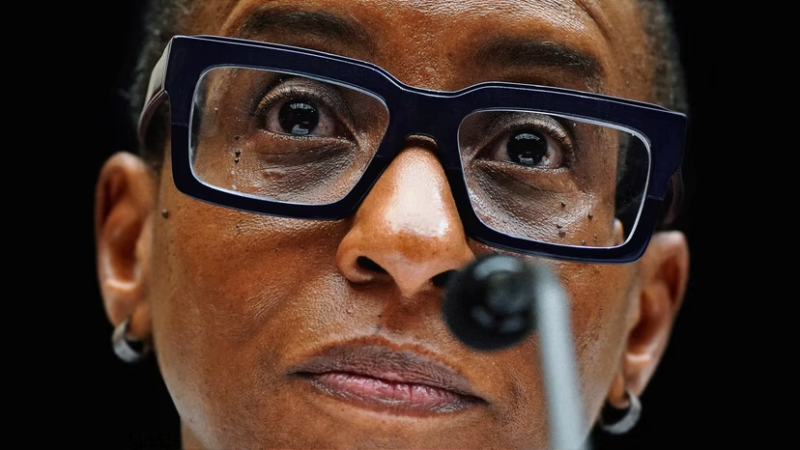 An Old-Fashioned Scandal Fells a New Harvard President. By David A. Graham / The Atlantic
An Old-Fashioned Scandal Fells a New Harvard President. By David A. Graham / The Atlantic
Claudine Gay resigned on Tuesday, becoming the shortest-tenured president in the university’s history.
Gay survived the initial backlash to her testimony, but since then, the furor around allegations of plagiarism has grown. Many of the examples that have been made public represent extremely lazy rewriting of source material—Gay borrowed sentences or paragraphs, making minor changes to their wording or order of clauses without adding much analysis of her own. Read more
Related: How a Proxy Fight Over Campus Politics Brought Down Harvard’s President. By
Related: Claudine Gay: What Just Happened at Harvard Is Bigger Than Me / NYT
Political / Social
 Nikki Haley’s comment on the US civil war was no gaffe. By Sidney Blumenthal / The Guardian
Nikki Haley’s comment on the US civil war was no gaffe. By Sidney Blumenthal / The Guardian
When asked about the cause of the civil war, she failed to mention slavery once. That is no surprise
Nikki Haley’s feigning of staggering ignorance about the cause of the US civil war unintentionally revealed her quandary in the Republican party. It was not a gaffe. Though it was a stumble, it was not a mistake, but a message she has delivered for years and that has served her well until now. Her carefully crafted and closely memorized garble was a deracinated version of an old lie, which she had used before to attempt to mollify hostile camps in order to skid by. Read more
Related: Nikki Haley deserves no grace for Civil War gaffe. By Heather Digby Parton / Salon
Related: Nikki Haley, Bobby Jindal and on-and-off relationships with Indian American identity. By
 Former Trump White House insiders call possible 2nd term a threat to American democracy. By Soo Rin Kim and Quinn Scanlan / ABC News
Former Trump White House insiders call possible 2nd term a threat to American democracy. By Soo Rin Kim and Quinn Scanlan / ABC News
“We don’t need to speculate,” one told “This Week” co-anchor Jonathan Karl.
Three women who served in former President Donald Trump‘s White House are now warning against a possible second Trump term, with one of them saying it could mean “the end of American democracy as we know it.” For the first time, former White House Communications Director Alyssa Farah Griffin, former White House deputy press secretary Sarah Matthews, and former White House aide Cassidy Hutchinson sat down together with ABC News “This Week” co-anchor Jonathan Karl to discuss their roles in speaking out against Trump in the wake of Jan. 6. Read more
Related: Trump’s Final Battle Has Begun. By Frank Bruni / NYT
Related: The Trump family’s hypocrisy on immigration. By Dean Obeidallah / CNN
 Biden Begins 2024 With Better Poll Numbers Than His Foes—and Fans—Recognize. By John Nichols / The Nation
Biden Begins 2024 With Better Poll Numbers Than His Foes—and Fans—Recognize. By John Nichols / The Nation
Has Biden turned a corner? Several recent survey have him leading Trump.
The biggest mistake that politicians and pundits make when they try to discern the direction of a presidential race is that they read a single poll and think it’s definitional. A lot of Democrats did exactly that on November 5 when The New York Times published a poll that showed President Joe Biden losing five out of the six most hotly contested battleground states. That, Doug Gordon observed in Newsweek, inspired “a palpable chorus of Democratic freakout and bedwetting.” Yet ensuing surveys from several of those same battleground states put Biden back in the lead. Moreover, Biden’s numbers in national polls, which in early November were distressing for Democrats, weren’t looking all that bad as 2023 came to an end. Read more
 Higher Education Wasn’t the Only Target of the Anti-Affirmative Action Movement. By Brandon Tensley / Capital B
Higher Education Wasn’t the Only Target of the Anti-Affirmative Action Movement. By Brandon Tensley / Capital B
The landmark ruling has already had an impact on everything from voting rights to health programs.
The moment the U.S. Supreme Court wiped out affirmative action in higher education in June, civil rights advocates warned that the effects could stretch beyond colleges and universities. Just months later, we can see that they were right. Read more
Related: Google Slashes Diversity Programs After Big Promises. By Johan Moreno / Forbes
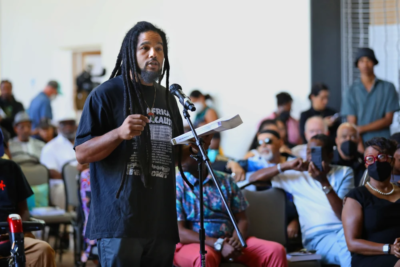 Reparations gained historic momentum in 2023 because of California’s efforts. By Curtis Bunn / NBC News
Reparations gained historic momentum in 2023 because of California’s efforts. By Curtis Bunn / NBC News
Christian Flagg, 33, speaks at the California Reparations Task Force meeting in Los Angeles to hear public input on Sept. 22, 2022.
For the first time, this year advocates seeking reparations for the harms inflicted on Black people during centuries of slavery in America saw a movement for redress that elicits hope. Many municipalities either started or are forming commissions to address compensation to the descendants of enslaved Africans. California has made the most zealous effort. The state’s reparations task force spent two years researching the impact of the generational damage of the discriminatory practices and produced a 1,100-page report with comprehensive recommendations that it considers to be the blueprint for other cities and states — and the federal government — to follow. Read more
Related: For Black People, Reparations Are About More Than Slavery. By Monique Judge / Newsone
 A Reading List to Better Grasp the New Great Black Migration. By Adam Mahoney / Capital B
A Reading List to Better Grasp the New Great Black Migration. By Adam Mahoney / Capital B
Black Americans are moving more than they ever have over the past 50 years, and just as during the Great Migration of the 20th century, they’re reshaping the entire fabric of the United States as they do.
As Black folks leave the West, Midwest, and North, the South has been the only region with more people moving in than out since 2000. In the aftermath, everything is being impacted, from the economy to politics, housing to education, and, of course, culture. While we’ve spent more than a year and a half reporting on this phenomenon, we wanted you to better understand just how monumental this moment is. Other newsrooms, researchers, and academics have also dedicated significant energy and manpower to mapping this migration and its impact. Here is some suggested reading: Read more
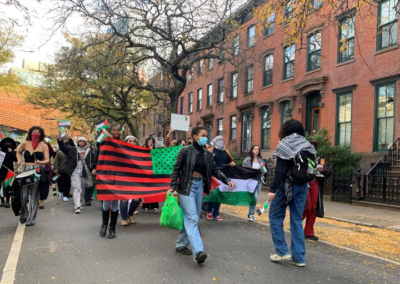 Black American Solidarity With Palestinians Is Rising, Testing Longstanding Jewish Alliance. By Noreen Nasir and Aaron Morrison / HuffPost
Black American Solidarity With Palestinians Is Rising, Testing Longstanding Jewish Alliance. By Noreen Nasir and Aaron Morrison / HuffPost
A growing number of Black Americans see the struggle of Palestinians reflected in their own struggles for racial equality and civil rights. Demonstrators march during the “Palestine to Africa- Palestinian Liberation is Black Liberation” protest in New York on November 5, 2023.
But that kinship sometimes strains the more than century-long alliance between Black and Jewish activists. From Black American groups that denounced the U.S. backing of Israel’s occupation of Palestinian territory to Black protesters demonstrating for the Palestinians’ right to self-determination, some Jewish Americans are concerned that support could escalate the threat of antisemitism and weaken Jewish-Black ties fortified during the Civil Rights Movement. Read more
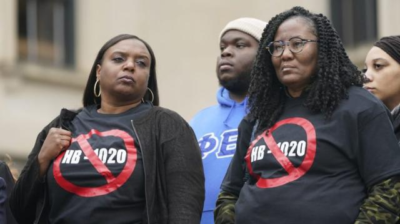 Why proposed state-run court in majority-Black Mississippi city sparks controversy. By Kiara Alfonseca / ABC News
Why proposed state-run court in majority-Black Mississippi city sparks controversy. By Kiara Alfonseca / ABC News
A federal judge decided on Dec. 31 that Mississippi can move forward in creating a state-run court system of unelected judges and prosecutors to preside over part of the majority-Black city of Jackson. However, the U.S. 5th Circuit Court of Appeals separately temporarily blocked the court’s creation until Jan. 5.
This law, by the majority-white and Republican-controlled Mississippi Legislature, has been the source of controversy and contention in the state. Some residents and civil rights organizations claim it takes away Black residents’ right to vote for local officials. Read more
 Half of Black D.C. residents lack easy access to health care, analysis shows. By Michael Brice-Saddler , Jenna Portnoy ,John D. Harden, and Janice Kai Chen / Wash Post
Half of Black D.C. residents lack easy access to health care, analysis shows. By Michael Brice-Saddler , Jenna Portnoy ,John D. Harden, and Janice Kai Chen / Wash Post
Nearly half of Black D.C. residents live in medically underserved areas — neighborhoods with a shortage of primary care services where the rates of heart disease, hypertension and other serious chronic conditions are more prevalent than in the rest of the city, a Washington Post analysis of federal data shows.
The numbers underscore the troubled state of health outcomes for Black residents in the nation’s capital, who for decades have been disproportionately affected by ailments like heart disease, diabetes, asthma and HIV, despite a flurry of initiatives to stem the tide. That concern is especially acute in the low-income communities concentrated east of the Anacostia River, where outcomes are notably worse than for White, Asian and Latino residents citywide. Read more
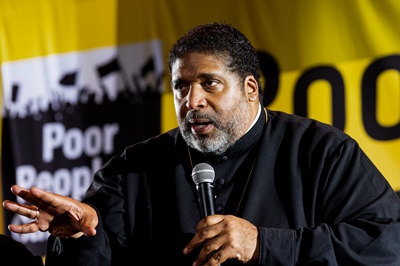 AMC apologizes to N.C. civil rights leader removed from ‘The Color Purple’ screening over seating issue. By
AMC apologizes to N.C. civil rights leader removed from ‘The Color Purple’ screening over seating issue. By
“We sincerely apologize to Bishop Barber for how he was treated, and for the frustration and inconvenience brought to him, his family, and his guests,” AMC Theatres said Wednesday.
AMC Theatres has apologized to a civil rights leader who was escorted out of a screening of “The Color Purple” in North Carolina by police after he tried to bring in his own chair he uses for an arthritic disability. The Rev. William J. Barber II, a minister and former president of North Carolina’s NAACP state chapter, attended a screening of the highly anticipated new film “The Color Purple” at AMC Fire Tower 12 in Greenville with his 90-year-old mother Tuesday. Read more
Ethics / Morality / Religion
 The Bible And Black People: A Torrid Love Affair. By Rev. Osagyefo Sekou / Newsone
The Bible And Black People: A Torrid Love Affair. By Rev. Osagyefo Sekou / Newsone
The Bible is not always right,” Rev. Dr. Brandon Thomas Crowley posted on Facebook. Crowley—a Harvard-educated pastor—continued, “We do not believe that our sacred text is written by God. It is not inerrant, humans wrote it. Sometimes the Bible is wrong and hermeneutics of suspicion are right!” Sending Black Christians into a frenzy of defense and denunciation, Crowley’s post received 1,800 comments and was shared 449 times. Read more
 What does Watch Night mean for Black Americans today? It dates back to the Emancipation Proclamation. By AP and RNS
What does Watch Night mean for Black Americans today? It dates back to the Emancipation Proclamation. By AP and RNS
The tradition of Watch Night services in the United States dates back to Dec. 31, 1862, when many Black Americans gathered in churches and other venues, waiting for President Abraham Lincoln to sign the Emancipation Proclamation into law, and thus free those still enslaved in the Confederacy.
It’s still being observed each New Year’s Eve, at many multiracial and predominantly Black churches across the country. What is the historical background of Watch Night services? As the Civil War raged on, Lincoln issued an executive order on Sept. 22, 1862, declaring that enslaved people in the rebellious Confederate states were legally free. However, this decree — the Emancipation Proclamation — would not take effect until the stroke of midnight heralding the new year. Those gathering on the first Watch Night included many African Americans who were still legally enslaved as they assembled, sometimes in secrecy. Read more
 Meet the New Apostolic Reformation, cutting edge of the Christian right. By Paul Rosenberg / Salon
Meet the New Apostolic Reformation, cutting edge of the Christian right. By Paul Rosenberg / Salon
Christian nationalism has new momentum — and a new movement that openly longs for “dominion” over secular America. US President Donald Trump is seen with Pastor Paula White at an event honoring Evangelical leadership in the State Dining Room of the White House on August 27, 2018 in Washington, DC. (MANDEL NGAN/AFP via Getty Images)
Lance Wallnau’s book, “God’s Chaos Candidate” played a significant role in solidifying evangelical support for Donald Trump in 2016, brushing aside concerns about his obvious lack of morality. Paula White-Cain gave the invocation at Trump’s inauguration in 2017, at his re-election campaign kick-off in 2019 and his Jan. 6, 2021, pre-insurrection rally. On the second occasion, she gave what experts describe as a ‘spiritual warfare’ prayer: “Let every demonic network that is aligned itself against the purpose, against the calling of President Trump, let it be broken, let it be torn down in the name of Jesus.” Read more
Related: This Is Why Jesus Wept. By Peter Wehner / NYT
 They Changed Their Minds about Slavery and Left a Bible Record. By David Dangerfield and Ramon Jackson / Christianity Today
They Changed Their Minds about Slavery and Left a Bible Record. By David Dangerfield and Ramon Jackson / Christianity Today
Two businessmen’s unusual conversion in 1700s South Carolina led them to liberate the people they put in bondage.
At first glance, William Turpin and his business partner, Thomas Wadsworth, appeared to be like most other prestigious and powerful white men in late 18th-century South Carolina. These two men changed their minds about slavery. They became committed abolitionists and worked to free dozens of enslaved people across South Carolina. When most wealthy, white Carolinians were increasingly committed to slavery and defending it as a Christian institution, Turpin and Wadsworth were compelled by their convictions to break the shackles they had placed on dozens of men and women. In an era when the Bible was edited so that enslaved people wouldn’t get the idea that God cared about their freedom, Turpin left a secret record of emancipation in a copy of the Scriptures, which is now in the South Carolina State Museum. Read more
Historical / Cultural
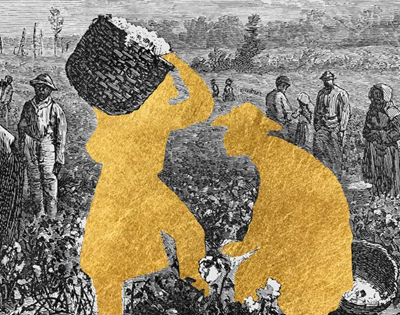 What the Civil War Was About. By Paul Krugman / NYT
What the Civil War Was About. By Paul Krugman / NYT
Of course the Civil War was about slavery, and everyone knew it at the time. No, Nikki Haley, it wasn’t about states’ rights, except to the extent that Southern states were trying to force Northern states to help maintain slavery — something that, as I’ll explain in a bit, has echoes in the current fight over abortion rights.
So Haley deserves all the condemnation she received for initially refusing to acknowledge the obvious in a campaign stop last week. But it may be worth delving a bit deeper into the background here. Why did slavery exist in the first place? Why was it confined to only part of the United States? And why were slaveholders willing to start a war to defend the institution, even though abolitionism was still a fairly small movement and they faced no imminent risk of losing their chattels? Read more
Related: Here’s the Civil War history they didn’t want you to know. By Howell Raines / Wash Post
 An Appeal for Impartial Suffrage. By Frederick Douglas / The Atlantic JANUARY 1867 ISSUE
An Appeal for Impartial Suffrage. By Frederick Douglas / The Atlantic JANUARY 1867 ISSUE
“Statesmen, beware what you do. The destiny of unborn and unnumbered generations is in your hands.”
A very limited statement of the argument for impartial suffrage, and for including the negro in the body politic, would require more space than can be reasonably asked here. It is supported by reasons as broad as the nature of man, and as numerous as the wants of society. Man is the only government-making animal in the world. His right to a participation in the production and operation of government is in inference from his nature, as direct and self-evident as is his right to acquire property or education. Read more
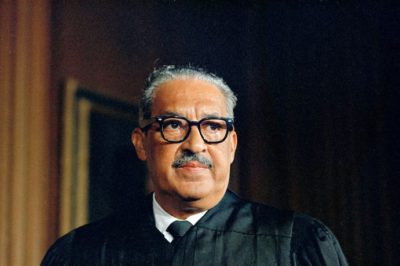 South Carolina plaintiffs seek to correct the civil rights record. By Kathleen Parker / Wash Post
South Carolina plaintiffs seek to correct the civil rights record. By Kathleen Parker / Wash Post
Americans might recognize Brown v. Board of Education as the title of the 1954 landmark Supreme Court decision that made racial segregation under the “separate but equal” doctrine unconstitutional. Before he became the first Black justice of the Supreme Court, Thurgood Marshall argued Brown v. Board of Education before the court. (Bob Schutz/AP)
What most surely do not know is that the name might have resulted from a clerical error and should have been Briggs v. Elliott. That was the first desegregation case submitted both to a federal district court and to the Supreme Court — by a group of courageous citizens in Clarendon County, S.C., nearly 70 years ago. Read more
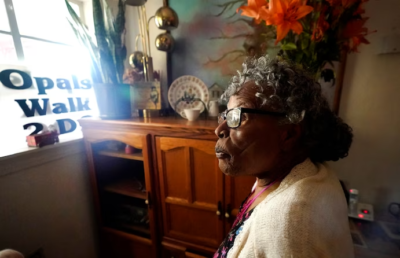 A racist mob destroyed her home. She was given the land 84 years later. By Timothy Bella / Wash Post
A racist mob destroyed her home. She was given the land 84 years later. By Timothy Bella / Wash Post
Before she would be known as the “grandmother of Juneteenth,” the day meant something different to Opal Lee, when she and her family fled their home in darkness in hope of surviving the racist mob that had come for them.
 Prequel: An American Fight Against Fascism. By Maddow, Rachel / Amazon
Prequel: An American Fight Against Fascism. By Maddow, Rachel / Amazon
#1 NEW YORK TIMES BESTSELLER • Rachel Maddow traces the fight to preserve American democracy back to World War II, when a handful of committed public servants and brave private citizens thwarted far-right plotters trying to steer our nation toward an alliance with the Nazis.
“A ripping read—well rendered, fast-paced and delivered with the same punch and assurance that she brings to a broadcast. . . . The parallels to the present day are strong, even startling.”—The New York Times (Editors’ Choice). Read more
Related: Trump echoes Hitler — and MAGA hears it loud and clear. By Heather Digby Parton / Salon
Related: The Polls Prove It: Many Republicans Love Fascism. By Brynn Tannehill / TNR
 The Color Purple review: The new movie stays true to Alice Walker’s message. By Nylah Burton / Vox
The Color Purple review: The new movie stays true to Alice Walker’s message. By Nylah Burton / Vox
The Color Purple is a melodrama — and the new movie musical keeps its traditions alive.
Going to see The Color Purple, Blitz Bazawule’s 2023 musical adaptation of Gary Griffin’s 2004 Broadway musical adaptation of director Steven Spielberg’s 1985 movie adaptation of Alice Walker’s 1982 novel — what a mouthful — was a rich experience of seeing several texts built and layered upon each other. And the movie theater itself provided a communal experience, especially for Black women, for whom this tale may be our seminal melodrama. Read more
Related: A Sense of Mystery and Wonder in a New “Color Purple.” By Richard Brody / The New Yorker
Related: Mo’Nique Belongs in Pay Inequality Fight With Taraji P. Henson. By Stephanie Holland / The Root
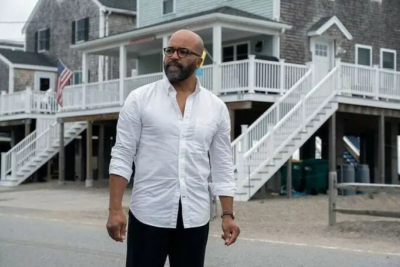 Film Review: ‘American Fiction’ and cluelessness in communication. By Jeanne Powell / Stark Insider
Film Review: ‘American Fiction’ and cluelessness in communication. By Jeanne Powell / Stark Insider
American Fiction opened in December 2023 to great expectations. Could first-time director Cord Jefferson successfully bring the wit, satire and parody of the 2001 novel to the screen? He could, and did.
In American Fiction the audience is introduced to an upper class family of color, a household headed by a medical doctor father. All his children earned doctorates, but our protagonist (played by Jeffrey Wright) chose the arts over medicine. As a disgruntled intellectual author of books no one reads, Thelonius “Monk” Ellison develops a slow rising resentment of Black intellectuals who write shallow up-from-the-gutter novels without having lived the experience, and whose books are praised and elevated by white publishing houses. Read more
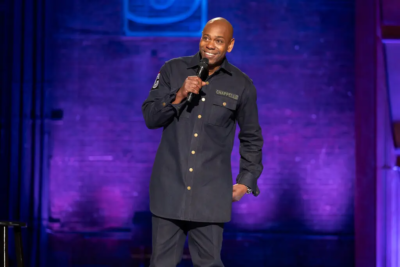 Dave Chappelle Assumes We’re Already Offended in His New Netflix Special. By Jason Zinoman / NYT
Dave Chappelle Assumes We’re Already Offended in His New Netflix Special. By Jason Zinoman / NYT
“The Dreamer” predictably includes trans and disabled jokes but punches down in other ways, too. Chappelle is part of a comedy elite that Gary Gulman pokes at.
The wildest moment in the new Dave Chappelle special, “The Dreamer” (Netflix), arrives about two-thirds of the way through when the comic says he’s about to tell a long story. That’s not the unusual part. Read more
 Black Music Sunday: Remembering musicians who left us in 2023, part 2. By Denise Oliver Velez
Black Music Sunday: Remembering musicians who left us in 2023, part 2. By Denise Oliver Velez
As we transition into a new year, let’s look back and remember the long list of musicians who shared their gifts with us before they passed on to join the ancestors over the past year. They represented every Black musical genre, with some excelling in multiple areas. Wayne Shorter performs during the 1979 Berkeley Jazz Festival.
Because we lost far too many artists this year to cram in one piece, today’s tribute is posting in two parts. You can find Part 1 here. Read more
Related: Jazz Pianist Les McCann, Best Known For ‘Compared To What,’ Dies At 88. By AP and Huff Post
Sports
 Russell Wilson’s benching and the casual disrespect of Black quarterbacks. By Ken Makin / Andscape
Russell Wilson’s benching and the casual disrespect of Black quarterbacks. By Ken Makin / Andscape
From Cam Newton to Lamar Jackson, the idea of the Black signal-caller still exists in the realm of underdog
Wilson has been a reservoir of patience in spite of his prima donna coach, Sean Payton, who has seemingly had it out for the signal caller since his “stop f—ing kissing babies” bit in the offseason. After a season of outbursts and cheap shots, Payton handed Wilson a final indignity when he benched him ahead of the Broncos’ final two games, even with the team in (precarious) playoff position. Read more
Related: MVP favorite Lamar Jackson cashed in and then balled out. By Kevin B. Blackstone / Wash Post
 Miami Heat guard Jaime Jaquez Jr. hopes to inspire new generation of Mexican NBA players, fans. By Marc J. Spears / Andscape
Miami Heat guard Jaime Jaquez Jr. hopes to inspire new generation of Mexican NBA players, fans. By Marc J. Spears / Andscape
Jaquez, one of several Mexican American players in NBA history, is a standout in his rookie year
Jaime Jaquez Jr. answered a few questions in Spanish following the Miami Heat’s New Year’s Day game against host the LA Clippers. It’s not often that an NBA player takes questions in Spanish. The Heat’s rookie guard is on a short list of NBA players of Mexican heritage to play in the league. But now with a global platform, this budding star hopes he can have an impact on aspiring basketball players from Mexico and Mexican Americans dreaming about playing in the NBA and WNBA who want to grow in the game. Read more
 ‘Nobody else looks like me’: How it feels to be a young Black swimmer. By Sam Jane / Wash Post
‘Nobody else looks like me’: How it feels to be a young Black swimmer. By Sam Jane / Wash Post
Swimming is one of the least diverse sports in the United States. A 2021 demographics report from USA Swimming said just 1.4 percent of its 200,000-plus year-round swimmers identified as African American or Black. (Twenty-nine percent did not respond to the ethnicity question.) Shown is Gabrielle Day.
In a sport dominated by White athletes, talented young Black swimmers feel the added pressure of participating in an arena where, as Day puts it, “nobody else looks like me.” In 2016 Rio de Janeiro Olympics, Simone Manuel would become the first African American woman to win a swimming gold medal in an individual event. Read more
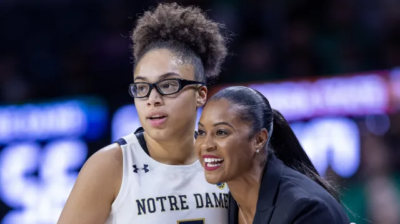 Notre Dame coach Niele Ivey is ascending at her alma mater. By Sean Hurd / Andscape
Notre Dame coach Niele Ivey is ascending at her alma mater. By Sean Hurd / Andscape
The first Black woman head coach in South Bend is adding to her legacy as a national championship player and assistant
On a graciously temperate December afternoon in South Bend, Indiana, Ivey exits Purcell Pavilion, where she just wrapped up practice with the women’s basketball team, to make her way across campus to the Grotto of Our Lady of Lourdes – a replica of the French shrine. The Grotto has stood since 1896 and served the Catholic university as a place of prayer. It’s a trip Ivey has made hundreds of times over the two decades she has spent on campus grounds – first as a player where she was a part of the Irish’s first ever national championship in 2001, then later as an assistant coach where she’d be a key part of an Irish program that made seven Final Fours in a nine-season span, winning a national championship in 2018. Now, as the head coach, those walks are filled with reflections of years past. Read more
Site Information
Articles appearing in the Digest are archived on our home page. And at the top of this page register your email to receive notification of new editions of Race Inquiry Digest.
Click here for earlier Digests. The site is searchable by name or topic. See “search” at the top of this page.
About Race Inquiry and Race Inquiry Digest. The Digest is published on Mondays and Thursdays.
Use the customized buttons below to share the Digest in an email, or post to your Facebook, Linkedin or Twitter accounts.